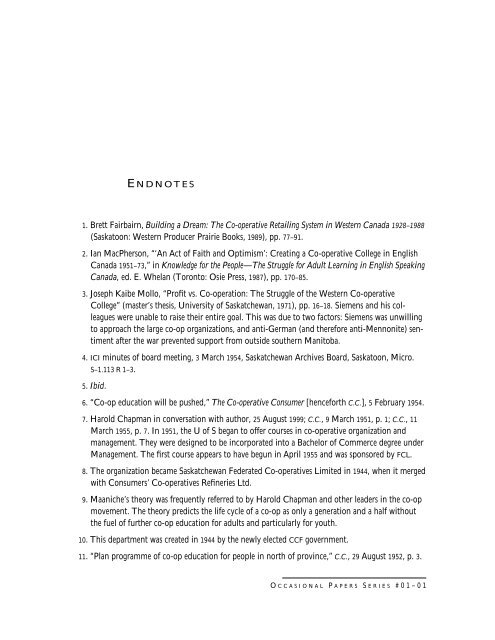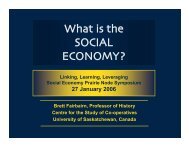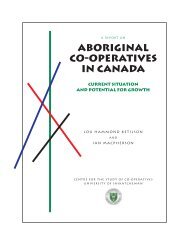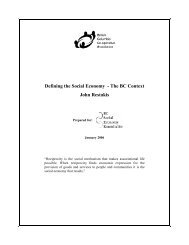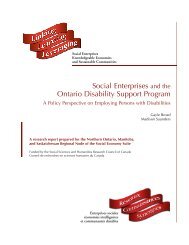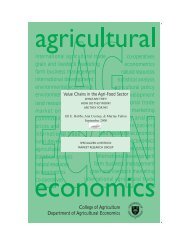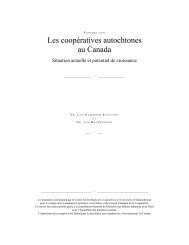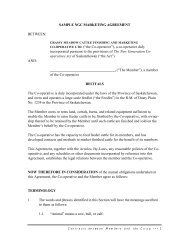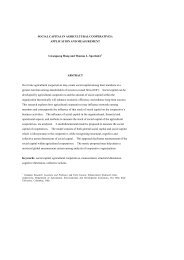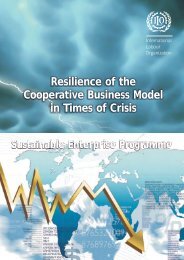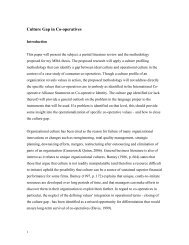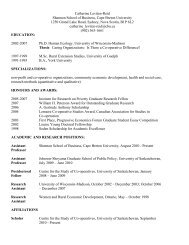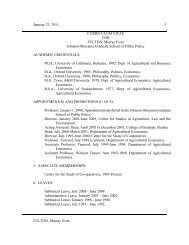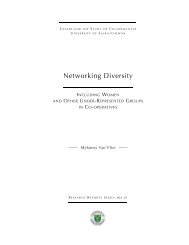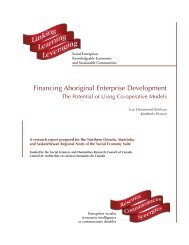Co-op College History - Centre for the Study of Co-operatives
Co-op College History - Centre for the Study of Co-operatives
Co-op College History - Centre for the Study of Co-operatives
Create successful ePaper yourself
Turn your PDF publications into a flip-book with our unique Google optimized e-Paper software.
E NDNOTES<br />
1. Brett Fairbairn, Building a Dream: The <strong>Co</strong>-<strong>op</strong>erative Retailing System in Western Canada 1928–1988<br />
(Saskatoon: Western Producer Prairie Books, 1989), pp. 77–91.<br />
2. Ian MacPherson, “‘An Act <strong>of</strong> Faith and Optimism’: Creating a <strong>Co</strong>-<strong>op</strong>erative <strong>Co</strong>llege in English<br />
Canada 1951–73,” in Knowledge <strong>for</strong> <strong>the</strong> Pe<strong>op</strong>le—The Struggle <strong>for</strong> Adult Learning in English Speaking<br />
Canada, ed. E. Whelan (Toronto: Osie Press, 1987), pp. 170–85.<br />
3. Joseph Kaibe Mollo, “Pr<strong>of</strong>it vs. <strong>Co</strong>-<strong>op</strong>eration: The Struggle <strong>of</strong> <strong>the</strong> Western <strong>Co</strong>-<strong>op</strong>erative<br />
<strong>Co</strong>llege” (master’s <strong>the</strong>sis, University <strong>of</strong> Saskatchewan, 1971), pp. 16–18. Siemens and his colleagues<br />
were unable to raise <strong>the</strong>ir entire goal. This was due to two factors: Siemens was unwilling<br />
to approach <strong>the</strong> large co-<strong>op</strong> organizations, and anti-German (and <strong>the</strong>re<strong>for</strong>e anti-Mennonite) sentiment<br />
after <strong>the</strong> war prevented support from outside sou<strong>the</strong>rn Manitoba.<br />
4. ICI minutes <strong>of</strong> board meeting, 3 March 1954, Saskatchewan Archives Board, Saskatoon, Micro.<br />
S–1.113 R 1–3.<br />
5. Ibid.<br />
6. “<strong>Co</strong>-<strong>op</strong> education will be pushed,” The <strong>Co</strong>-<strong>op</strong>erative <strong>Co</strong>nsumer [hence<strong>for</strong>th C.C.], 5 February 1954.<br />
7. Harold Chapman in conversation with author, 25 August 1999; C.C., 9 March 1951, p. 1; C.C., 11<br />
March 1955, p. 7. In 1951, <strong>the</strong> U <strong>of</strong> S began to <strong>of</strong>fer courses in co-<strong>op</strong>erative organization and<br />
management. They were designed to be incorporated into a Bachelor <strong>of</strong> <strong>Co</strong>mmerce degree under<br />
Management. The first course appears to have begun in April 1955 and was sponsored by FCL.<br />
8. The organization became Saskatchewan Federated <strong>Co</strong>-<strong>op</strong>eratives Limited in 1944, when it merged<br />
with <strong>Co</strong>nsumers’ <strong>Co</strong>-<strong>op</strong>eratives Refineries Ltd.<br />
9. Maaniche’s <strong>the</strong>ory was frequently referred to by Harold Chapman and o<strong>the</strong>r leaders in <strong>the</strong> co-<strong>op</strong><br />
movement. The <strong>the</strong>ory predicts <strong>the</strong> life cycle <strong>of</strong> a co-<strong>op</strong> as only a generation and a half without<br />
<strong>the</strong> fuel <strong>of</strong> fur<strong>the</strong>r co-<strong>op</strong> education <strong>for</strong> adults and particularly <strong>for</strong> youth.<br />
10. This department was created in 1944 by <strong>the</strong> newly elected CCF government.<br />
11. “Plan programme <strong>of</strong> co-<strong>op</strong> education <strong>for</strong> pe<strong>op</strong>le in north <strong>of</strong> province,” C.C., 29 August 1952, p. 3.<br />
O CCASIONAL P APERS S ERIES #01–01


